For the past few years, global law firm Perkins Coie LLP has been publishing their annual Augmented and Virtual Reality Survey report, collecting thoughts, insights and predictions from leading industry experts worldwide. While one of the main objectives of this annual study is to provide a “temperature check”, the Perkins Coie LLP AR VR survey serves a much larger purpose through standardizing a number of prompts to help us track how far the industry of immersive technologies has come thus far.
This year’s survey was completed by a total of 191 respondents, ranging from startup professionals and key investors to enterprise technology firms. The main conclusion from this year’s questionnaire is an overall sense of optimism and growing momentum for immersive solutions appearing in the mainstream. Not only are businesses showing greater interest in adoption, but many are broadening avenues for monetization and exploring new ways to apply XR tools into their workflows.
One important factor to note is that this survey was officially published in March and was taken prior to the coronavirus outbreak. Much of the results will not reflect the unique spike in usage and transition into remote immersive technologies due to our current circumstances. But while the results may not be completely representative, a number of key findings and predictions fall in line with how these technologies are currently being used amidst the pandemic. So let’s dive deeper into 4 key findings from this survey.
"Plummeting hardware and software costs, increasingly impactful applications outside of entertainment, and the ubiquity of mobile devices are contributing to the rise of immersive, XR technologies"
1. Strength Across All Sectors
Just like in previous years, all divisions of immersive technologies have continued to experience significant growth in both maturing their platforms and converting prospects into AR/VR advocates. More and more people have been enlightened and inspired by the power to spatially visualize data, spaces, and scenarios in real-time and with accuracy.
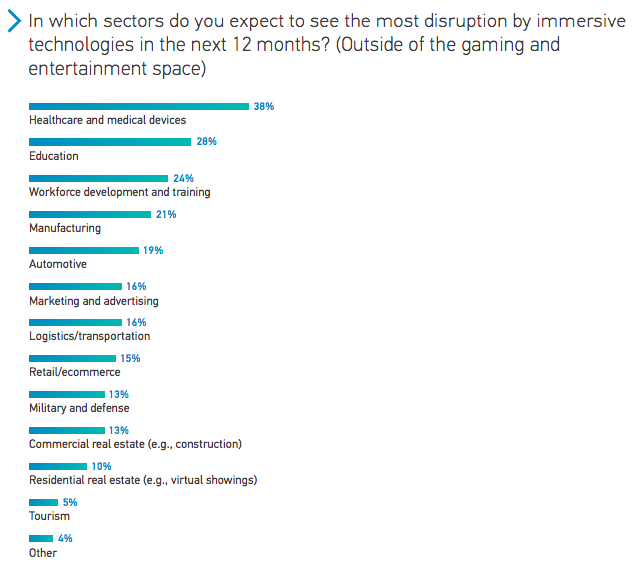
Even before the pandemic, experts saw the greatest potential for these immersive technologies in healthcare, education, and skills development. However, while these industries will likely experience the most amount of disruption in the next few months, participants noted how they expect that immersive technologies will continue to play a large role in improving efficiency, day-to-day operations, and overall outcomes across a variety of business verticals.
2. Immersive Technologies & Smart Cities
One new section the survey highlighted was how immersive technologies are starting to play a large role in “Smart City” initiatives. Smart Cities refer to urban areas that utilize new technologies like cloud computing, advanced analytics, and blockchain to collect data in order to improve services and quality of life. Cities all over the world have started turning to these technologies as a way to rethink urban planning and redesign areas to make them more liveable.
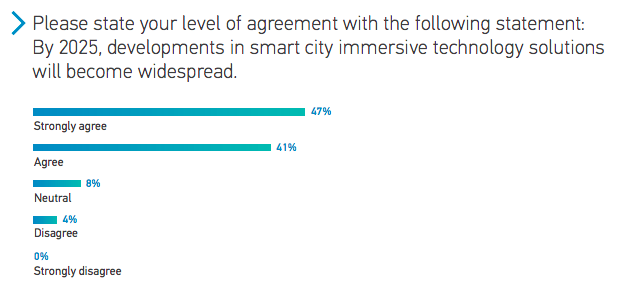
From the survey’s findings, 88% of respondents strongly agree that immersive technologies will become ingrained in smart city efforts by 2025. With professionals forecasting AR and VR to be used in enhanced navigation (57%), urban planning (44%), traffic flow management (44%), improved parking systems (43%), smart building management (42%), and disaster response (37%), the significant amount of interest and confidence signals a huge amount of potential for growth in this area.
3. Notable Enterprise Uses
When it came to the prompt of which application/solution would businesses most likely look to immersive technologies in improving day-to-day operations, participants responded with employee training (70%), workflow management (50%), and live feedback/evaluation (48%). However, 47% of respondents also said that collaboration with remote employees will be an area where immersive technologies will be a useful tool in answering many of the barriers they are facing in promoting efficient and effective teamwork.
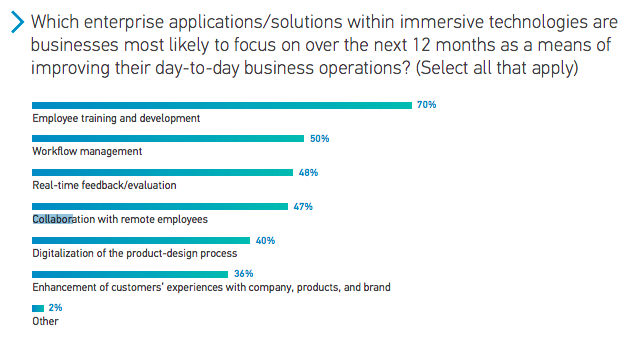
Although this survey was conducted way before the pandemic, it’s interesting to see the results relative to our current situation. According to the respondent’s predictions, the industry was already heading in this direction, and perhaps the events that came out of responding to COVID-19 sped up the period to adoption.
4. Previous Barriers Still Remain
While all experts are overwhelmingly optimistic as to where the XR industry is heading, there are still a number of barriers that professionals are still struggling to breakthrough. When asking participants that are entrepreneurs or work in a startup company, many were facing similar concerns from investors as to whether there was an actual market for these technologies and whether they’re just a couple steps too far ahead of what consumers and other businesses actually want.
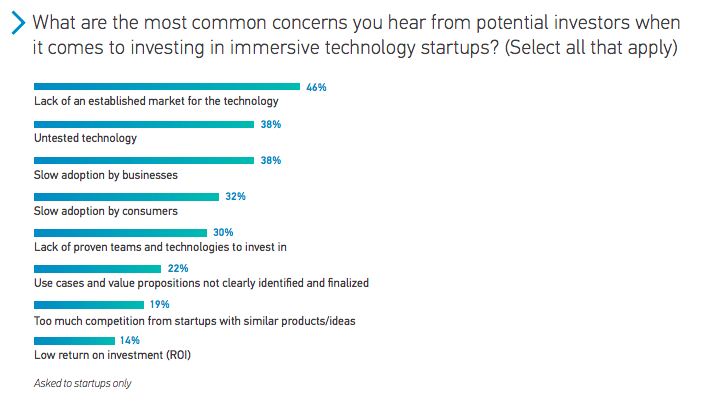
Plus, when it comes to mass adoption of AR or VR, there are still hurdles in regards to seamless user experience, ease in creating compatible content, or just uneasiness to jumping on board with something so unfamiliar and “new”.
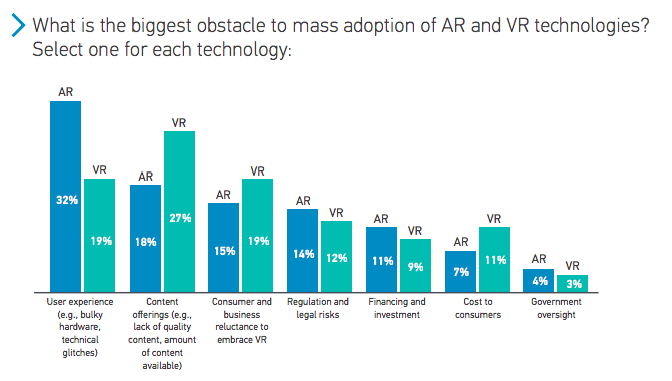
Many entrepreneurs and XR startups have been working hard for many years trying to find answers to these very real and very large points of friction. However, while these barriers may often seem impenetrable, this pandemic may have been the catalyst in chipping away these obstacles and accelerating what experts were already anticipating.
Looking Forward to 2021
Although this year’s Perkins Coie LLP AR VR survey was published right before countries all over the world went into lockdown, many of their findings actually came into fruition because of the pandemic. Whether it be the emphasis of immersive applications for education and healthcare or enhancing day-to-day operations, it’s fascinating seeing how COVID-19 may have been the nudge businesses needed to see for themselves how transformative AR and VR solutions are. We are definitely looking forward to seeing the conclusions from next year’s report and how our current remote work situation has affected businesses in exploring and adopting immersive technologies.
We would like to thank Perkins Coie LLP for their insightful 2020 report on where the XR industry is and where it’s heading. To read the full survey and its findings, you can click here. For inspiration and information on how transformative VR can be in your workflows, sign up for our free 5-day course to learn all you need to know in just a few short sessions.



.jpg?width=245&height=150&name=active-adult-beautiful-1799244%20(1).jpg)


.jpg?width=245&height=150&name=tomasz-frankowski-kBUfvkbFIoE-unsplash%20(1).jpg)
